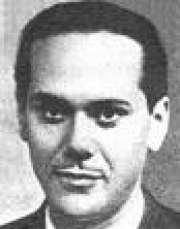Pàgina: 1
CONTIGO
:
Poemas 2008-04-07 (8666 senalas)
ADOLESCENTE FUI...
:
Poemas 2008-04-07 (6435 senalas)
CÓMO LLENARTE, SOLEDAD
:
Poemas 2008-04-07 (6531 senalas)
DANS MA PÉNICHE
:
Poemas 2008-04-07 (6636 senalas)
DESEO
:
Poemas 2008-04-07 (6751 senalas)
DIRÉ CÓMO NACISTEIS
:
Poemas 2008-04-09 (5959 senalas)
EL VIENTO Y EL ALMA
:
Poemas 2008-04-09 (6185 senalas)
ERAS, INSTANTE, TAN CLARO...
:
Poemas 2008-04-16 (5807 senalas)
LA SOMBRA
:
Poemas 2008-04-16 (6252 senalas)
LAS ISLAS
:
Poemas 2008-04-16 (5850 senalas)
LOS ESPINOS
:
Poemas 2008-04-16 (6159 senalas)
LOS FANTASMAS DEL DESEO
:
Poemas 2008-04-16 (5942 senalas)
LOS MARINEROS SON LAS ALAS DEL AMOR
:
Poemas 2008-04-17 (6258 senalas)
NO DECÍA PALABRAS
:
Poemas 2008-04-17 (8420 senalas)
NO ES EL AMOR QUIEN MUERE...
:
Poemas 2008-04-17 (6206 senalas)
NO INTENTEMOS EL AMOR NUNCA
:
Poemas 2008-04-17 (5784 senalas)
NO QUIERO, TRISTE ESPÍRITU...
:
Poemas 2008-04-17 (6532 senalas)
ORILLAS DEL AMOR
:
Poemas 2008-04-17 (6005 senalas)
OSCURIDAD COMPLETA
:
Poemas 2008-04-17 (6059 senalas)
PAÍS
:
Poemas 2008-05-02 (6227 senalas)
PEREGRINO
:
Poemas 2008-05-02 (8887 senalas)
REMORDIMIENTO EN TRAJE DE NOCHE
:
Poemas 2008-05-03 (7506 senalas)
Pàgina: 1 |
|

|
|
|
|
Biografía Luis Cernuda
Luis Cernuda (born Luis Cernuda Bidón September 21, 1902, Seville – November 5, 1963, Mexico City), was a Spanish poet and literary critic.
The son of a military man, Cernuda received a strict education as a child, and then studied law at the University of Seville, where he met the poet and literature professor Pedro Salinas. In 1928, after his mother died, Cernuda left his hometown, with which he had all his life an intense love-hate relationship. He briefly moved to Madrid, where he quickly became part of the literary scene. However, his detached, timid and morose character, his search of perfection frequently made him lose friendships and popularity.
His mentor and former professor Salinas arranged for him to take a lectureship for a year at the University of Toulouse. From June 1929 until 1937 Cernuda lived in Madrid and participated actively in the literary and cultural scene of the Spanish capital. Cernuda collaborated with many organisations working to support a more liberal and tolerant Spain. He participated in the Second Congress of Anti-Fascist Intellectuals in Valencia.
During the Spanish Civil War a friend secured him a position as teacher in Cranleigh School, where he taught Spanish Language and literature. After WWII another friend got him a lectureship in Holyoke, Massachusetts, USA, where he would spend some years. Later on, moved by his sentimental relationships, he would move to Mexico, where he died.
The central concerns of this poet are evident in the title of his life's major opus: La realidad y el deseo ("Reality and Desire"). He published his first collection of verse, Perfil del aire ("Air's profile"), in 1927. Several books followed, and he collected new and already published poetry under this title in 1936. Subsequent editions would include new poetry as new books inside La realidad y el deseo. Expanded on almost until his death in 1963, in this work the poet explores desire, love, subject, object, history and sexuality in poems which draw influences from romanticism, classicism, and the surrealist avant-garde. Besides verse, he also published a collection of reminiscent prose poems, 'Ocnos', about his childhood in Seville.
Cernuda is known as a member of the Generation of '27, a group of Spanish poets and artists including Federico García Lorca. He broke new ground with Los Placeres Prohibidos ("Forbidden Pleasures"), an avant-garde work in which the poet used surrealism to explore his sexuality. During his British period he became deeply familiar with English poetry, which he would admire for its containment and lack of superfluous artifice and paraphernalia. He would also translate several poems and plays into Spanish. He would comment that translating Shakespeare's Troilus and Cressida made him intensely happy.
Deeply influenced by André Gide, Cernuda embraced his homosexuality at an early age and made homosexual desire and love the core of his poetry. Or, at least, unlike other gay poets at the time, in his poetry he was never ambiguous about the fact that the objects of his desire and love were men. One of the most influential poets in contemporary Spanish poetry, he is definitely a crucial ground-breaking figure for homosexual writing in Spanish.
During the Spanish Civil War, deeply moved by the assassination of Federico Garcia Lorca, Cernuda fled to England, where he began an exile that later took him to France, Scotland, Massachusetts (Mount Holyoke College), California and finally settling in Mexico; he never returned to Spain. He never married and had no children.
His major English language critics include Derek Harris and Phillip Silver.
Select works
Poetry: La realidad y el deseo
Prose poems: Ocnos, Variaciones sobre un tema Mexicano. Written in Water
Criticism: Literatura Poesia I & II
|





